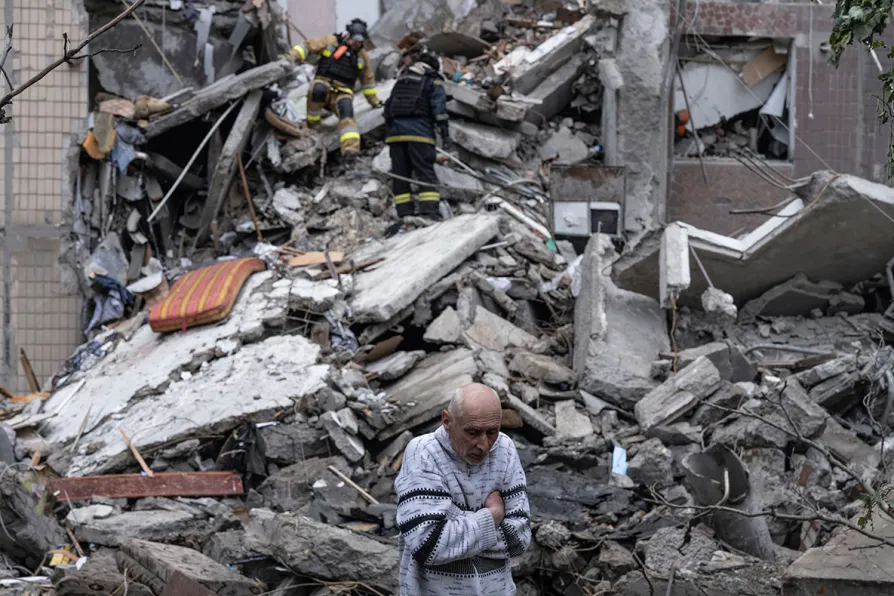Secret consultation documents finally released after the Morning Star’s two-year freedom of information battle show the Home Office misrepresented public opinion, claiming support for policies that most respondents actually strongly criticised as dangerous and unfair, writes SOLOMON HUGHES
In the first of two articles, DANIEL POWELL investigates the causal aspects of the Russo-Ukrainian war as Britain commemorates 80 years since VE Day

 A man waits to hear about his missing wife as rescuers clear the rubble of a multi-storey residential building destroyed a day before by a Russian air strike, in Kostiantynivka, Ukraine, May 8, 2025
A man waits to hear about his missing wife as rescuers clear the rubble of a multi-storey residential building destroyed a day before by a Russian air strike, in Kostiantynivka, Ukraine, May 8, 2025
AS guns fell silent and peace dawned across Europe in May 1945 with the final defeat of Hitler, a top secret document laid on Churchill’s desk — a plan for British and US forces in Germany to re-arm their former enemy, and jointly attack the front line held by their former Soviet allies. “The date for the opening of hostilities is July 1 1945” — four days before a general election.
The aptly named Operation Unthinkable concluded the Red Army could not be routed, and was shelved by Attlee’s Labour after a landslide win as the nation entered five decades of cold war. Declassified in 1998, the document echoes a common lament of German officers in British captivity: their two nations should not be in conflict, but together fighting the real enemy — the USSR.
Now, as Britain commemorates VE Day, the unthinkable has come to pass: the nation is in a de facto state of war with Russia, over the fate of its neighbour Ukraine — a catastrophic conflict causing millions displaced, hundreds of thousands killed, and the world closer than ever to nuclear war. With some British public services now bracing for cuts of up to 11 per cent to continue funding militarism in Ukraine, remembrance of the sacrifices made for VE Day are worthy of reflection, and asking a simple question — how did it come to this?
There are many pieces to the puzzle of causation for the war — this article cannot give them all — culpability of the Russian state is easily found by reading British mainstream media sources, so it does not need to be reiterated here; but readers may find some insight into some causes lost in the overall narrative presented by media that the late war correspondent John Pilger described as the most propagandised war of his lifetime.
At the dawn of the cold war in 1954, Soviet foreign minister Molotov requested to join Nato but was rejected.
With the fall of the USSR and Warsaw Pact in 1991, US delegates assured president Gorbachev that Nato would not expand to threaten security of Russia’s Western border.
Two decades subsequent, that verbal pledge proved false; ex-Soviet satellite states aligned with a US-led military alliance now looking to leave them rudderless under Trump’s America First policy. Putin suggested Russia join Nato in 2001 — calling on a common cause to fight Islamist terrorism. Yet expansion continued, and in 2008 Nato announced that Ukraine would eventually become a member. For Russia, the possibility of this encroachment was the last straw, aware of the US investing $5 billion in Ukraine’s politics via NGOs up to 2014.
This was the year Ukraine’s president Yanukovych, mired by corruption, hesitated between signing a trade deal with the EU, demanding austerity as it did with Greece prior, and an alternative offer from Russia securing low-cost gas, albeit with restrictions on EU trade and ties. Mass protests erupted at Maidan Square in Kiev, from those frustrated at the prospect of no integration with the West.

















